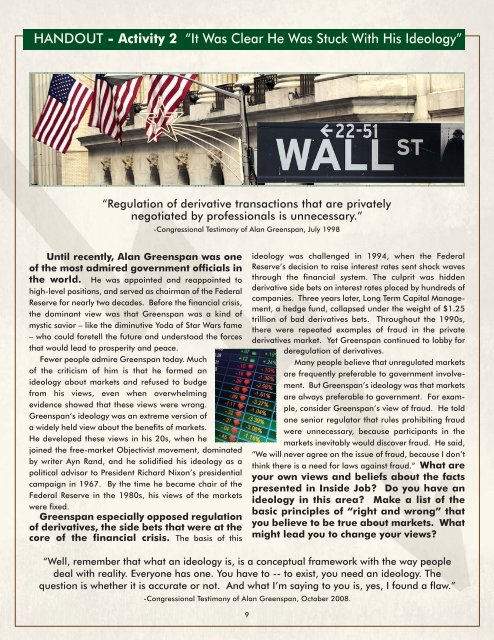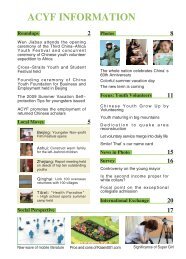INSIDE JOB
INSIDE JOB
INSIDE JOB
- No tags were found...
You also want an ePaper? Increase the reach of your titles
YUMPU automatically turns print PDFs into web optimized ePapers that Google loves.
HANDOUT - Activity 2 “It Was Clear He Was Stuck With His Ideology”“Regulation of derivative transactions that are privatelynegotiated by professionals is unnecessary.”-Congressional Testimony of Alan Greenspan, July 1998Until recently, Alan Greenspan was oneof the most admired government officials inthe world. He was appointed and reappointed tohigh-level positions, and served as chairman of the FederalReserve for nearly two decades. Before the financial crisis,the dominant view was that Greenspan was a kind ofmystic savior – like the diminutive Yoda of Star Wars fame– who could foretell the future and understood the forcesthat would lead to prosperity and peace.Fewer people admire Greenspan today. Muchof the criticism of him is that he formed anideology about markets and refused to budgefrom his views, even when overwhelmingevidence showed that these views were wrong.Greenspan’s ideology was an extreme version ofa widely held view about the benefits of markets.He developed these views in his 20s, when hejoined the free-market Objectivist movement, dominatedby writer Ayn Rand, and he solidified his ideology as apolitical advisor to President Richard Nixon’s presidentialcampaign in 1967. By the time he became chair of theFederal Reserve in the 1980s, his views of the marketswere fixed.Greenspan especially opposed regulationof derivatives, the side bets that were at thecore of the financial crisis. The basis of thisideology was challenged in 1994, when the FederalReserve’s decision to raise interest rates sent shock wavesthrough the financial system. The culprit was hiddenderivative side bets on interest rates placed by hundreds ofcompanies. Three years later, Long Term Capital Management,a hedge fund, collapsed under the weight of $1.25trillion of bad derivatives bets. Throughout the 1990s,there were repeated examples of fraud in the privatederivatives market. Yet Greenspan continued to lobby forderegulation of derivatives.Many people believe that unregulated marketsare frequently preferable to government involvement.But Greenspan’s ideology was that marketsare always preferable to government. For example,consider Greenspan’s view of fraud. He toldone senior regulator that rules prohibiting fraudwere unnecessary, because participants in themarkets inevitably would discover fraud. He said,“We will never agree on the issue of fraud, because I don’tthink there is a need for laws against fraud.” What areyour own views and beliefs about the factspresented in Inside Job? Do you have anideology in this area? Make a list of thebasic principles of “right and wrong” thatyou believe to be true about markets. Whatmight lead you to change your views?“Well, remember that what an ideology is, is a conceptual framework with the way peopledeal with reality. Everyone has one. You have to -- to exist, you need an ideology. Thequestion is whether it is accurate or not. And what I’m saying to you is, yes, I found a flaw.”-Congressional Testimony of Alan Greenspan, October 2008.9







